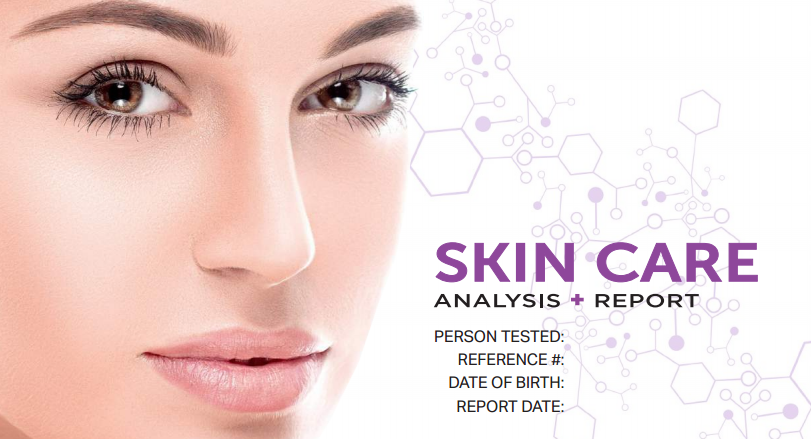Science in Skin Care: Taking your skin to the next level
Many beauticians and shop assistants simply prescribe a cream based upon whether your skin is dry, oily or normal. This is not enough. Skin care is not simply about finding the right cream. The right cream and skin care plan can only be maximised by knowing your genes and scientifically discovering what really works for your DNA. The results for this DNA test are ready in 15 working days from the receipt of samples.
View a sample result by clicking the below image:

7 different aspects of skin care in your results
The SkinCareDNA test will establish whether you are high risk, medium risk or low risk in all of the following 7 aspects of skin ageing:
Category 1: Fine lines and Wrinkles: Our bodies ability to form collagen or the rate at which it degrades are one aspect of wrinkles. Another important factor is a process known as glycation. Glycation is highly dependent on our intake of sugar (glucose) and the rate at which we can genetically rid our bodies of the by-products of sugar metabolites known as Advanced Glycation End Products (A.G.E). These glycation end products damage skin proteins and can inhibit the production of collagen and elastin or contribute towards breaking these proteins down. Certain gene variations put us more at the mercy of glycation – do you have these gene variations? Find out with our SkinCareDNA test.
Category 2: Sun protection– Are you genetically predisposed to sun damage, pigmentation and skin discoloration from the sun’s damaging UV rays or do you have genes which offer enhanced solar protection (natural genetic solar protection factor)? The results of this stage of the test will help you assess just how much sun you can take, the type of sun screens you need to use as well as their strength.
Category 3: Skin Sensitivity– have you every broken out in spots? Itchy or sensitive skin? Rashes? What is causing these inflammatory reactions? This stage of the test will tell you whether you are predisposed, genetically, to skin inflammation and sensitivity – two key factors in ageing. The test may help you avoid factors that can increase sensitivity.
Category 4: Skin elasticity: skin should be supple and able to stretch back neatly to its original shape. Collagen and elastin gives skin its structure but some of us may be set back by genes that reduce this natural elasticity.
Category 5: Pigmentation: Melanin is a pigment that protects us from harmful UV rays by absorbing these rays and dissipating. It blocks UV radiation from damaging DNA by blocking free radicals and potentially causing skin cancer.
Category 6: Collagen quality – the firmness and elasticity of your skin is determined by collagen, a protein which gives skin that nice plump and ironed appearance. As we age, fine lines and wrinkles begin appearing because our body’s ability to regenerate collagen decreases. This test will confirm whether you have an imbalance of the genes responsible for synthesising as well as breaking down collagen and determine whether you are genetically predisposed to premature ageing.
Category 7: Skin antioxidants – How able is your skin of producing antioxidants that fight free radical damage? Much of this ability is in your genes. The plumpy, fresh, youthful appearance is highly dependent on the antioxidants in your body as these help fight the highly reactive free radicals which circulate in your body ready to attack any other molecule they find.
Sample collection
Sample collection for your skin DNA test is straightforward and simple. GTLDNA sends out a kit following confirmation of your order. The kit is sent to the address you specify at the time of order. In 3 easy steps you can collect your DNA sample and send this back for analysis in our laboratory.
- Rub the oral swabs under your tongue and against your inner cheek
- Allow the swabs to dry for an hour
- Seal the swabs into their envelope and sent them back for testing
Note: The SkinCareDNA test is scientifically proven to help in skin treatment and in tailoring your skin care regime in such a way that it complements your genes and maximises the appearance of your skin. This said, the ageing process cannot be halted although it could be slowed down. Factors we have control over, such as exposure to the sun, diet and life style will contribute considerably to the way we age as will skin care. Other factors, which also contribute to ageing, namely gravity and time, cannot be controlled.
